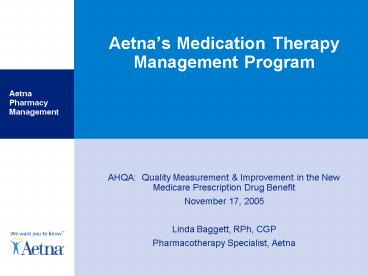Aetnas Medication Therapy Management Program - PowerPoint PPT Presentation
1 / 19
Title:
Aetnas Medication Therapy Management Program
Description:
Three analytical models developed by Aetna to predict future drug costs ... Gleaned from Aetna Data Warehouse- Rx, Med, Lab, Behavioral Health claims ... – PowerPoint PPT presentation
Number of Views:319
Avg rating:3.0/5.0
Title: Aetnas Medication Therapy Management Program
1
Aetnas Medication Therapy Management Program
- AHQA Quality Measurement Improvement in the
New Medicare Prescription Drug Benefit - November 17, 2005
- Linda Baggett, RPh, CGP
- Pharmacotherapy Specialist, Aetna
2
The Goal
- To optimize therapeutic outcomes by improving
medication use and reducing drug misadventures
Federal Register / VOL. 70, No. 18 \ page 4279
3
Criteria for MTMP Eligibility
- To be eligible for participation in an MTMP, all
three criteria must be met. - The beneficiary
- Must have multiple chronic diseases,
- Must be using multiple part D drugs, and
- Is likely to incur annual costs for covered Part
D drugs that exceed a level specified by the
Secretary
4
Aetnas MTM ProgramCriterion 1
- Multiple Chronic Diseases
- Selection based on high cost, high morbidity,
prevalent, and difficult-to-manage diseases - Any two out of six chronic diseases
- Cardiovascular disease
- Asthma/chronic obstructive pulmonary disease
- Diabetes
- Chronic renal failure
- Cerebrovascular disease
- Rheumatoid arthritis
- Use drugs as proxy and medical claims data for
disease identification
5
Aetnas MTM Program Criterion 2
- Multiple Covered Part D Drugs
- Six or more unique covered Part D drugs
- Expected outcomes
- Address polypharmacy and over-utilization
- Look for opportunities to decrease complicated
drug regimens that may lead to non-compliance,
drug misadventures, increased costs for the
member
6
Aetnas MTM Program Criterion 3
- Total Incurred Cost for Covered Part D Drugs
- Beneficiary is likely to incur annual costs of at
least 4,000 for all covered Part D drugs - Three analytical models developed by Aetna to
predict future drug costs - Other modeling tools to be incorporated such as
those based on Pharmacy Risk Groups (PRG)
7
Stages of Aetnas MTM Program
- Identification of members through informatics
programming - Information packet with relevant demographic,
pharmacy, medical, and lab data is compiled - Information packet feeds into the electronic
documentation system - Pharmacotherapy specialist (PTS) evaluates data
for risk-stratification and prioritization - PTS performs outreach, documentation, follow-up,
referral
8
MTM Workflow
Database Demographic, Pharmacy, Medical, Lab
data
Member Identification and Information Packet
Criteria algorithms
Once per month
Previously IDd members excluded
Risk Stratification and Outreach by PTS
Electronic Documentation Management System
Case management referral
9
Aetnas MTM Program Information Packet
- Contains 51 data elements
- Gleaned from Aetna Data Warehouse- Rx, Med, Lab,
Behavioral Health claims - Automatically populates the necessary fields in
the electronic documentation management system. - Hard copies of the information packet available
for PTS to assist with outreach - Records maintained for a period of no less than
ten years.
10
Aetnas MTM Program Information Packet
- Contents
- Lipid lab values, compliance indicators,
drug-drug drug-age interactions, disease
indicators - Predictive modeling pharmacy risk group (PRG)
scores from the risk stratification algorithms - Risk designation values for further
stratification. - Disease management and case management activity
information - The number of maintenance acute drugs,
estimated annual RX costs, past year RX costs,
YTD RX costs
11
Information Packet Risk Stratification Evaluation
12
Example of MTM for a Patient with
- Major Dx
- cardiovascular (CAD, HF), diabetes, depression
- Drug Therapy
- Mobic (rheumatologist)
- Ibuprofen, Prozac, propoxypheneAPAP (internist)
- Ultracet (pain specialist)
- Prevacid (gastroenterologist)
- Marplan (psychiatrist)
- Digoxin, lisinopril, metoprolol, furosemide
(cardiologist) - Metformin (endocrinologist)
- Compliance issues identified with lisinopril,
metoprolol, metformin
13
Assessment of Problem
- Therapeutic duplication with Mobic and ibuprofen
- Acetaminophen toxicity potential
- GI problems from Mobic, ibuprofen, and Ultram
requiring Prevacid - Drug interaction with Prozac and Marplan
- Propoxyphene not appropriate in the elderly
- Metformin contraindicated in CHF
14
MTM Program Components for PDP
- Medication history assessment by PTS
- Coordination of medication management with
- Patient
- Caregiver/s
- Skilled nursing facility
- Physician/s
- Education
- Compliance (patient, physician)
- Generic drugs (patient, physician)
- Disease/s, condition/s (patient)
- Need for additional or alternative therapies
(physician) - Polypharmacy issues (physician)
- Interactions, drug safety (physician)
15
MTM Program Components for PDP
- Referral to nurse case management for
socio-economic needs - Financial assistance needed for
- Medication
- Food
- Rent/housing/utilities
- Transportation assistance
- Medicaid and/or Social Security application
- Caregiver issues
16
Additional Activities for MA-PD
- All PDP activities listed previously
- Lab and medical claims data available for
- Disease identification/confirmation
- Predictive modeling
- Disease management
- Transplant coordination
17
Additional Activities for MA-PD
- Referral from PTS to nurse case manager for
- Terminal Care, Compassionate Care Programs
- Suspected abuse
- Caregiver issues
- Specific diseases
- HIV, ESRD, CHF, cancer, traumatic injuries
- Discharge planning
- Health risk assessments
18
The Future of MTM at Aetna
- Use of external MTM programs and providers
(retail pharmacists for direct contact and
outreach) - Outcome studies in collaboration with CMS and
other institutions - e-prescribing and electronic records initiatives
- Best practices implementation
- Expand the programs into the commercial
population
19
Aetnas Medication Therapy Management Program
- Thank you!































